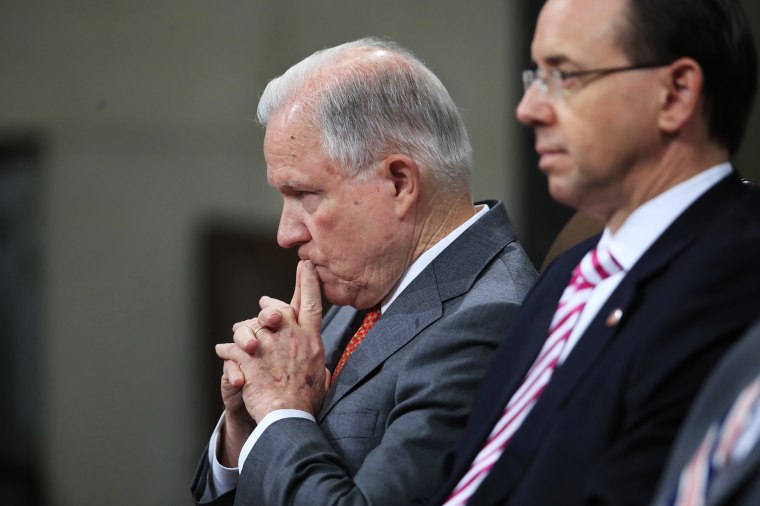In the Trump administration’s latest effort to deliver on promises to its base, Attorney General Jeff Sessions announced a new “religious liberty task force” at the Department of Justice. Sessions made the announcement at a Religious Liberty Summit, which was backed by Alliance Defending Freedom (ADF). But a closer look at what Sessions and groups like the ADF mean when they talk about “religious liberty” makes clear how both religion and freedom are being redefined by this administration to serve an extreme agenda. It’s time for people who care about the future of democratic society to reclaim the concept of religious liberty.
Plenty of Americans still value the separation of church and state and, along with it, the establishment clause’s guarantee of freedom of conscience for all people. Outside the circles of the extreme right, religious liberty has long been a progressive value, celebrated by abolitionists, tax resisters, conscientious objectors and religious minorities alike. So long as an American respects the legal rights of his neighbor, the Constitution promises him the freedom to obey his own conscience when it comes to matters of religious conviction.
But when groups like the ADF talk about religious liberty, they are really talking about liberty for one specific religion — Christianity. In this context, the phrase has become a rallying cry for Christian conservatives whose religious and political interests align around issues like reversing Roe v. Wade and rolling back LGBT protections. Indeed, in their study “Make America Christian Again,” sociologists Andrew Whitehead, Samuel Baker, and Joseph Perry conclude, independent of other influences, Christian nationalism was the single most determinative indicator of support for candidate Donald Trump in the 2016.
Founded in 1994 as the Alliance Defense Fund, the ADF is a legal advocacy and organizing coalition for Christian nationalists that has been aggressive in pushing for a decidedly unequal definition of religious liberty. The ADF believes not only that America was founded as a Christian nation, but also that religious conservatives like themselves must save America from moral decline. Sessions and the Trump administration’s ties to the ADF are well-known — in 2017, Sessions consulted the ADF while drafting new DOJ guidance on how to interpret federal religious liberty protections.
The ADF seems particularly focused on limiting the liberty of LGBT Americans, however. In his 2003 book “The Homosexual Agenda: Exposing the Principle Threat to Religious Freedom Today,” former ADF president Alan Sears accused fellow Americans who advocated for marriage equality of a secret agenda to “lead young men and women into homosexual behavior.” In Sears’ conspiracy theory, gay marriage is part of a larger plot to silence conservative Christians.
This idea that LGBT and other minorities were threatening the rights of the Christian majority gained traction during the decade when marriage equality was winding its way through the federal courts. Painting themselves as victims of an amoral scheme, Christian nationalists have argued that their religious freedom is slowly but surely being curtailed by gay wedding cakes and transgender bathroom bills.
Like Sessions, apparently, Trump has embraced this narrative wholesale. In his declaration celebrating Religious Freedom Day on January 16, 2018, he wrote that “No American — whether a nun, nurse, baker, or business owner — should be forced to choose between the tenants of faith or adherence to the law.”
In reality, these arguments boil down to one thing: discrimination. It is not enough for Christian nationalists to freely exercise their vision of a good life. In the name of “liberty,” they want the right to discriminate against those with whom they disagree.
As a Christian minister myself, I’m both offended by this abuse of faith and troubled by the lack of moral outrage against it.
As a Christian minister myself, I’m both offended by this abuse of faith and troubled by the lack of moral outrage against it. Whatever our political commitments, the Bible calls Christians to love God by loving our neighbors as we love ourselves. This is why Baptists in colonial America argued against the establishment of religious tests by governing authorities.
In colonial Virginia, John Leland, whose writings on religious liberty influenced Thomas Jefferson and the Constitution, was an abolitionist. Because he knew that the state church was controlled by slaveholders, he insisted that men must have the right to teach the good news of liberty for all people.
As a person of faith, I recognize others’ rights to try to persuade their neighbors to ascribe to their deeply held beliefs. But I cannot remain silent while religious leaders try to redefine religious liberty as a tool of discrimination — and enlist government officials to push this agenda on a federal scale.
Christian nationalists like Jerry Falwell, Jr., Paula White, Robert Jeffress and Franklin Graham are consistently called upon to offer a “religious perspective” on issues of public concern. My own free conscience compels me to call their bluff, and I hope others will join me.
Jonathan Wilson-Hartgrove is a Baptist minister in Durham, North Carolina and the author of "Reconstructing the Gospel: Finding Freedom From Slaveholder Religion."
